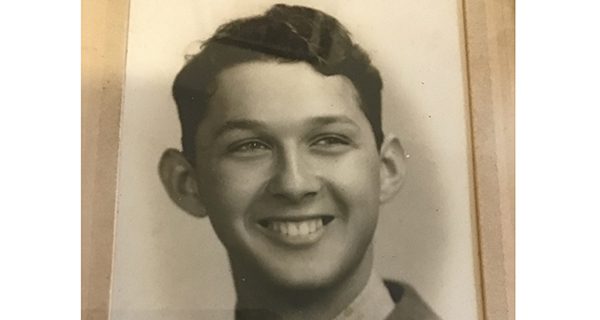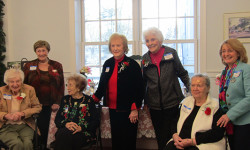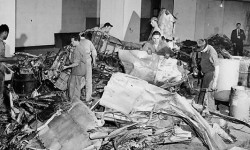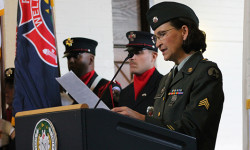[ccfic caption-text format="plaintext"]
By Linda Thomas
Hometown Weekly Correspondent
Sol Fineblum didn’t have much but three cigarettes to barter with.
He grew up in Baltimore during the 20s and 30s. Members of his generation not only relinquished a portion of their childhoods to the desperation of the Great Depression, but forfeited the promise of their young adulthood to help save the world.
He was the kind of guy who, no matter where he was or what was happening — even in war — found a way to love his neighbor, even if that neighbor was his enemy. He could see the humanity in everyone, even a German soldier holding a machine gun.
Fineblum was 18 when he landed at Omaha Beach on Sept. 8, 1944, three months after the D-Day invasion. He served as an infantry rifleman with Company A, 301st Infantry Regiment, 94th Division. He fought his way across France, and, in 2005 at the Boston Harbor, he earned a Chevalier de France: Knight of the French Empire.
He is one soldier who will not be there when the 75th anniversary of D-Day is celebrated June 6, 2019; he died in April 2016.
Many soldiers seldom tell their war stories. But Sol did, and his wife, Carol, who still lives in the home in Needham they shared since 2003, knew them all.
“It was on our honeymoon in September 1946 when I had to awaken him from his screaming nightmares,” she said. “And soon he began to tell me his war stories, which helped to liberate himself of those horrific memories.”
Like Sol, Carol was born in Baltimore on Broadway at Fells Point Wharf. He lived at 309 and she at 308. She was 4, and he was 5, when they met.
“When I stood in my crib at 18 months, I could see the second floor of their building,” she recalled. “Our first floor was my father's tailor shop, where sailors came to order suits for $2, sometimes $5, depending on the fabric and style.”
Carol has been paying attention to Sol ever since.
In January 1945, Sol was captured and held prisoner at a German camp for nearly four months. Sometimes they were put on a cattle car; other times they marched.
“Marching north to Stalag 11B, Sol witnessed proof of the kindness from individuals in towns along the route,” Carol said. “German citizens offered food to the unshaven, debilitated soldiers. One schoolboy offered his lunchbox.”
Prisoners couldn’t go from the American compound to the British compound. If they did, a guard would shoot.
Sol saved cigarettes in his jacket pocket from the Red Cross packages, hoping to trade them for bread for his buddies, who were dying of starvation and amoebic dysentery.
He watched as a Red Cross worker wearing an armband walked between the two compounds.
“Do you smoke?” he asked, to which the worker replied, yes.
And, so, Sol traded the cigarettes in exchange for the armband allowing access to both compounds - and with it, the ability to collect bread for his comrades.
Then, at one point, Carol said he heard three men speaking Hebrew.
“Amazed at hearing Hebrew in a German POW camp, Sol stopped and asked who they were, and they told him: ‘We are from Samaria in the Holy Land.’ My husband noticed the word Palestine was sewn on their army shirts, which they had worn since being captured in Tobruk, North Africa in 1941.
“They told him they had volunteered with the British, their occupiers, in order to defeat Hitler. After being captured, they were shipped to Germany for incarceration.
“They, like my husband, were MIA.”
The stories continue.
Sol and the rest of the American prisoners were on a train from one camp to another. He spotted a fellow prisoner sitting on his helmet, wearing a wet jacket, freezing near to death after falling from a snow mound in January.
Sol had two sweaters pinned inside his own jacket and gave them to the shivering soldier.
A few years later, after the war, that soldier and his wife and two children visited Sol. He returned the two sweaters he had saved, and told Sol: “These are not my children; they are yours. I would not have had them if not for you.”
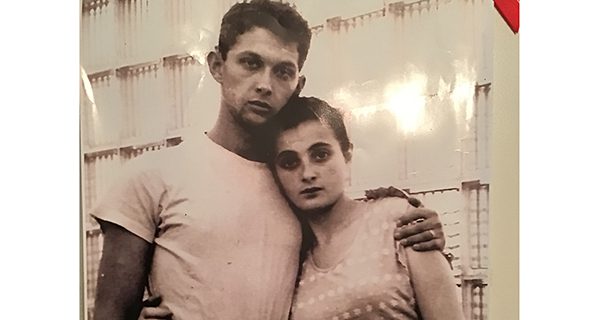
Carol and Sol Fineblum in Los Angeles in 1946; they were students at UCLA. Sol still sports army pants in the shot.
Sol was liberated on his birthday, April 21, 1945. He was sent to England to recuperate for three months before returning to the States in July.
Carol was exhilarated when she learned Sol was coming home.
“My brother came up to the apartment above our store and said, ‘Sol’s home,’” she recalled.
“I came tearing down the steps and the steps had a landing, and I came around that landing, saw him in the store and jumped off the third step at him, almost knocked him over. It was complete exhilaration seeing him. He looked wonderful and he had been fattened up by the British in the Midlands of England.”
She asked Sol about his experience. He began to explain day by day, month by month, what happened to him from the time he landed on Omaha Beach until he was liberated.
He told her a story about running across a field to capture the Nazi soldiers inside a barn when four machine gunners fired at him, killing his friend who was nearby.
“He turned around, ran back to his buddy, picked him up in his arms — and, then, there was silence. His buddy bled from the mouth, dying,” Carol said.
The four German soldiers then stopped firing.
“They wouldn’t shoot him,” she said. “They eyed each other. They could have easily killed him. He was a good target. But they didn’t. I asked Sol, ‘Why didn’t they shoot you … could it have been God … how come they shot your buddy?’
“We talked about it for years and finally decided what it was. In 1944-1945, there were no SS [Schutzstaffel] anymore. They were gone. All of these German fighters were old men. They were being drafted at age 45 and 50. And those old men saw Sol as their own son.
“‘How could you kill a kid who comes all the way back to help his buddy?’
“They stood next to their guns and watched him.”
Carol said Sol spent years agonizing about having to kill a German rifleman in self-defense — and that rifleman’s face, not yet bearded, often haunted him in his dreams.
But Myron’s story was even sadder.
“Myron, a Jewish kid, an only child, was running through the foxholes as artillery rained down on them and sharpshooters were aiming at them,” she said.
“Sol was running over bodies in the trench with Myron running behind. Sol tripped, and as he went down, Myron took a bullet meant for Sol and fell. Sol looked back and saw Myron dying in the trench. Sol would not step on the fallen bodies of his buddies, jumped out of the trench periodically to avoid them, and the sergeant yelled, ‘Fineblum, get back in there.’”
Sol and Carol married Sept. 8, 1946, and soon moved to Los Angeles, where they were students at UCLA. There, Myron’s parents visited them and wanted to learn about their son they believed was still missing in action.
“They arrived and interrogated Sol,” she said, “asking, ‘Was he short? Did he wear glasses? Was he blonde?’”
They were trying to establish if Sol saw another boy die rather than their son.
“But after Sol assured them it was indeed Myron, his mother wept, and his father rose and shook Sol’s hand. After they left, Sol turned to me and quietly whispered, ‘I had to kill their only child for them.’
“Hence, the nightmares.”
Sol was the son of Morris and Rose Fineblum, who owned and operated a candy liquor and tobacco store near the waterfront of Broadway.
“People ate out of trash cans,” Carol recalled. “Children didn’t know the taste of milk. It was 1935, and the Depression was deepening.
“When a disheveled, drunk man entered the store and asked for a fifth of liquor Four Roses Bourbon, Morris reached over to smell his breath and if he detected alcohol, he called over to Sol, ‘Sonny, come on and take him over to Old Athens’ and then said to the man, ‘Put that money away and go buy milk for your children.’”
Young Sol jumped into duty much as he did in 1944 when the lieutenant yelled, “When I say three, we go.” He accompanied the drunk across Broadway to the Old Athens Restaurant (next-door to Carol’s father’s store and apartment), asked the owner to feed the man a lunch, and put the bill on Morris Fineblum's tab, which he paid each month to help the impoverished, unemployed of Fells Point.
“That was the underpinning of the moral, caring, empathetic, adolescent soldier and man that Sol became,” Carol said.
Living in the 20s and 30s was daunting.
Those years, Carol said, were characterized by deprivation and hunger — and sadness.
“People were looking for jobs that there were none,” she said. “They were desperate to feed their children, and they were drinking [alcohol] out of sadness and desperation.
“And here we were together in Baltimore, Maryland, a southern city where the African-American community were considered second-rate citizens. They were clearly at the bottom of the barrel.”
But, she said, the circumstances didn’t produce any anger or division. There was a sense of acceptance of each other — acceptance of their common ordeal.
“And the interesting thing is the deprivation of the Depression was similar to the deprivation of the war,” Carol said.
“Both of them required harmony. Both required we get along and work together for a common cause, even though they were different: one was economic, the other was warfare. Both put us in the position of having to care about each other and to work for a common goal.”
Sol received a Master’s degree in mechanical engineering from George Washington University and years later helped to put a man on the moon as part of the Apollo 11 program in New Jersey. AT&T was the evaluator of the Apollo program and it contracted to NASA, which placed engineers in Houston and Washington, D.C. to monitor and evaluate the Apollo program. Sol was one of those engineers.
Carol also received a master’s degree from George Washington University and later a doctorate degree from Columbia University. She worked with special needs children, but her primary goal and career, she said, was raising their five daughters — now their nine grandchildren and 16 great-grandchildren.
“Nothing mattered much as that,” she said.
Perhaps Sol Fineblum survived D-Day and a prisoner of war camp and then being captured. But, yet, even after he was freed, it’s like he never left. When he crossed the beaches of Normandy, he’d be in Europe for the long haul. To him, every year after that would always be 1944.
Sol carried the certainty of indecency and kindness back with him to Baltimore.
Even in war, there were acts of kindness as soldiers discovered their human side and were reminded that each person in the world is someone’s brother, sister, father, mother — people capable of love and passion, regret and sorrow, kindness and mercy.
“Things that happened in the war showed there were human beings there, even though Sol knew, somehow, they were killing his buddies and the 6 million Jews being murdered in the concentration camps,” Carol said.
“He didn’t say all people are good. He knew there were bad people.
“But he found enough good in people to know there was hope for the world.”
AUTHOR’S NOTE: This story is in remembrance of my friend, mentor and encourager, Randy McCarthy. Your likeness cannot be replicated.
Editor’s Note: Linda Thomas writes for Hometown Weekly Publications, Inc. For comments and suggestions, she can be reached at lindasfaces@gmail.com.




